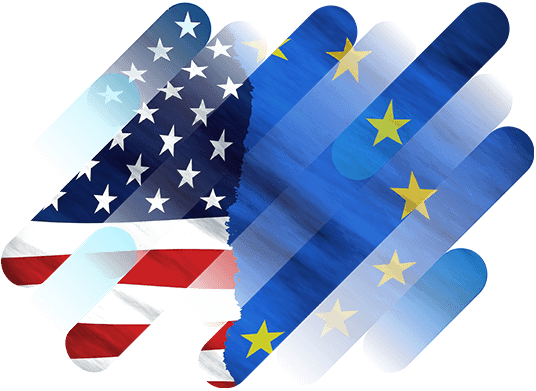Visit us at it-sa in Nuremberg from October 7 to 9. Get your free ticket now!
Home>
Digital sovereignty with Myra
Why digital sovereignty matters
Digital sovereignty is essential for ensuring data protection, independence, and IT security in the long term. Those who retain control over infrastructure and data protect not only information, but also their freedom to act.
Ensure data protection – protect sensitive data from unauthorized access by third countries
Avoid dependencies – independence from foreign cloud providers and foreign law
Secure future viability – strengthen legal certainty, compliance, and competitive advantages
Voices from the field: Why experts are calling for greater digital sovereignty
Podcast Sneak Peek
Myra Minds Episode 1: Prof. Dr. Dennis-Kenji Kipker (only available in German)
In the first interview, Christof Klaus talks to Prof. Dr. Dennis-Kenji Kipker about the challenges associated with legally compliant TLS termination and other key issues of our time:
Digital sovereignty
IT compliance
Risks when choosing a provider
TLS termination: Where trust and responsibility begin
SSL/TLS encryption effectively protects data from prying eyes and manipulation – but at the same time makes it more difficult to detect threats. To defend against attacks in encrypted traffic, security solutions must temporarily break the encryption (SSL/TLS termination) and analyze the data stream in a targeted manner.
Since this also exposes personal data for short periods of time, this process is particularly sensitive from a data protection and compliance perspective – because not every service provider has the necessary expertise and legal certainty to perform TLS termination securely and in compliance with the GDPR.
Upon request, Myra performs TLS termination exclusively in certified data centers in Germany – under German jurisdiction, in compliance with the GDPR, and in accordance with audit requirements.
Learn more about TLS terminationMore digital independence with Myra

IT security solutions made in Germany
Myra develops all security solutions in Germany, serving as a secure European alternative to US solutions.

Legally compliant with GDPR
Our solutions are legally GDPR-compliant and offer a comprehensive level of compliance for the most demanding requirements.

Data processing in Germany upon request
At Myra, SSL/TLS termination is carried out exclusively in Germany at the customer's request.

PoPs in many European countries
We have many PoP locations throughout Europe, outside the jurisdiction of US laws such as the CLOUD Act or FISA Section 702.
This is how Myra compares to competitors in terms of digital sovereignty
Legally GDPR compliant (not subject to US CLOUD Act and FISA Section 702) | ||
Option to exclusively process data in German data centers | ||
Technology development in EU / Germany | ||
Company management based in EU / Germany | ||
EU / German law applies |


FAQ: Data protection agreements, surveillance laws, and more.
Safe Harbor was a data protection agreement between the EU and the US that was in place from 2000 to 2015 and was intended to enable data transfers between the two regions. It was based on self-certification by US companies that committed to complying with certain data protection principles without any external monitoring. The European Court of Justice declared Safe Harbor invalid in 2015 because the level of data protection in the US was considered insufficient and EU citizens were not granted adequate legal protection (Schrems I).
The EU-US Privacy Shield was introduced in 2016 as the successor to Safe Harbor and was intended to ensure a higher level of data protection for EU citizens when transferring personal data to the US. US companies could voluntarily certify themselves and had to comply with stricter data protection rules, with compliance being monitored and violations sanctioned. This agreement was also declared invalid by the European Court of Justice in 2020 due to continuing concerns about protection against access by US authorities and the lack of legal remedies for EU citizens (Schrems II).
The EU-US Data Privacy Framework has been the current legal framework for data transfers between the EU and the US since July 2023. It provides for new safeguards, including restrictions on access by US intelligence services and the introduction of an independent “Data Protection Review Court” for complaints from EU citizens. Only certified US companies may receive personal data from the EU, with the European Commission recognizing the level of data protection in these companies as adequate.
The US CLOUD Act obliges American companies to disclose data – even if it is stored on servers outside the US. If you use US-based cloud providers, there is therefore a risk that US authorities can access your data – without your knowledge or any control by European courts.
International data protection agreements such as the Trans-Atlantic Data Privacy Framework (TADPF) are intended to provide legal certainty for data exchanges between the EU and the US. However, such agreements are often criticized because they do not guarantee the same level of protection as the GDPR. Previous agreements such as Safe Harbor and Privacy Shield have already been overturned by the European Court of Justice, so companies should not rely solely on such agreements.
Following the collapse of the Privacy Shield agreement, the use of many US services is now legally problematic. According to the GDPR, the transfer of personal data to third countries without adequate data protection is only permitted under very strict conditions – and entails liability risks.
Digital sovereignty means that you always know and control where your data is located, who has access to it, and which laws apply to your infrastructure. This not only protects you from data leaks, but also from legal uncertainties and damage to your image.
With providers such as Myra as a German Cloudflare alternative, you are choosing a European, GDPR-compliant alternative that focuses on compliance, transparency, and security. This allows you to remain independent, auditable, and compliant with regulatory requirements — e.g., for critical infrastructure, the public sector, or data-sensitive industries.


